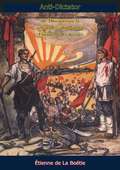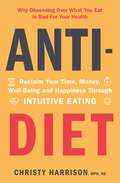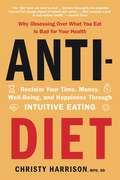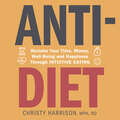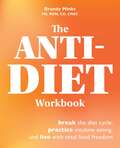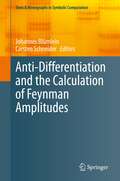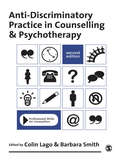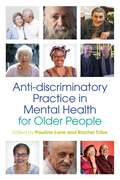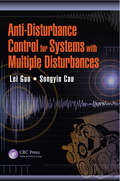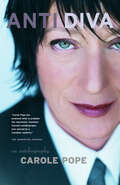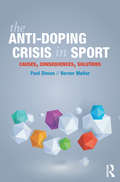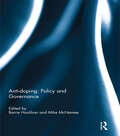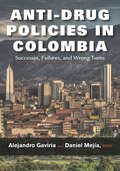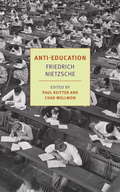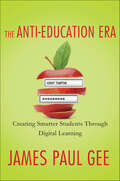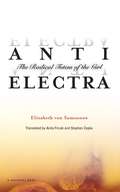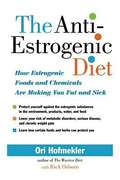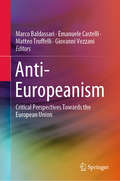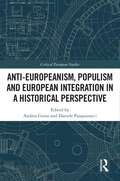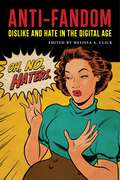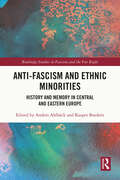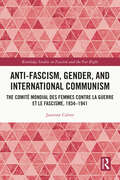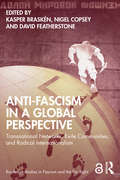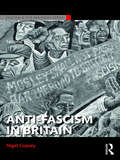- Table View
- List View
Anti-Dictator: the Discours sur la servitude volontaire of Étienne de La Boétie
by Étienne de La BoétieThis famous essay asserts that tyrants have power because the people give it to them. La Boetie linked together obedience and domination, a relationship which would be later elaborated by anarchist thinkers. By advocating a solution of simply refusing to support the tyrant, he became one of the earliest advocates of civil disobedience and nonviolent resistance. “To him, the great mystery of politics was obedience to rulers. Why in the world do people agree to be looted and otherwise oppressed by government overlords? It is not just fear, Boetie explains in “The Discourse on Voluntary Servitude,” for our consent is required. And that consent can be non-violently withdrawn.”—Lew Rockwell
Anti-Diet: Reclaim Your Time, Money, Well-Being and Happiness Through Intuitive Eating
by Christy HarrisonA how-to guide to reclaiming your time, money, health and happiness in our toxic diet culture.In Anti-Diet, Christy Harrison takes on diet culture and the multi-billion-pound industries that profit from it, exposing all the ways it robs people of their time, money, health and happiness. It will turn what you think you know about health and wellness upside down, as Harrison explores the history of diet culture, how it's infiltrated the health and wellness world, how to recognise it in all its sneaky forms, and how letting go of efforts to lose weight or eat 'perfectly' actually helps to improve people's health - no matter their size. Drawing on scientific research, personal experience and stories from patients and colleagues, Anti-Diet provides a radical alternative to diet culture, and helps readers reclaim their bodies, minds, and lives so they can focus on the things that truly matter.'Please read this book! Anti-Diet is the book to end all diet books, and will be a game changer for so many people. Christy is an expert on this subject and leaves no stone unturned in exposing how insidious and harmful diet culture is - and teaching readers how to opt-out of the madness.' - Caroline Dooner, author of The F*ck It Diet 'A huge burden has been lifted: I no longer have to revise my first book to reflect current understanding! Christy Harrison beat me to it. I'm blown away by how good Anti-Diet is. Using a social justice lens, well-researched and smart science, captivating storytelling, and practical advice, this book will help you reclaim your life from the throttle of diet culture.'- Linda Bacon, author of Health at Every Size, co-author of Body Respect'Most diet and wellness books claim to address mind, body, and spirit, but in fact they are just about body. Thank goodness for Christy Harrison, whose empathetic book reveals oppressive diet culture for what it truly is, and offers a genuinely holistic alternative.' - Alan Levinovitz, author of The Gluten Lie
Anti-Diet: Reclaim Your Time, Money, Well-Being, and Happiness Through Intuitive Eating
by Christy HarrisonReclaim your time, money, health, and happiness from our toxic diet culture with groundbreaking strategies from a registered dietitian, journalist, and host of the "Food Psych" podcast.68 percent of Americans have dieted at some point in their lives. But upwards of 90% of people who intentionally lose weight gain it back within five years. And as many as 66% of people who embark on weight-loss efforts end up gaining more weight than they lost. If dieting is so clearly ineffective, why are we so obsessed with it?The culprit is diet culture, a system of beliefs that equates thinness to health and moral virtue, promotes weight loss as a means of attaining higher status, and demonizes certain ways of eating while elevating others. It's sexist, racist, and classist, yet this way of thinking about food and bodies is so embedded in the fabric of our society that it can be hard to recognize. It masquerades as health, wellness, and fitness, and for some, it is all-consuming. In Anti-Diet, Christy Harrison takes on diet culture and the multi-billion-dollar industries that profit from it, exposing all the ways it robs people of their time, money, health, and happiness. It will turn what you think you know about health and wellness upside down, as Harrison explores the history of diet culture, how it's infiltrated the health and wellness world, how to recognize it in all its sneaky forms, and how letting go of efforts to lose weight or eat "perfectly" actually helps to improve people's health -- no matter their size. Drawing on scientific research, personal experience, and stories from patients and colleagues, Anti-Diet provides a radical alternative to diet culture, and helps readers reclaim their bodies, minds, and lives so they can focus on the things that truly matter.
Anti-Diet: Reclaim Your Time, Money, Well-Being and Happiness Through Intuitive Eating
by Christy HarrisonA how-to guide to reclaiming your time, money, health and happiness in our toxic diet culture.In Anti-Diet, Christy Harrison takes on diet culture and the multi-billion-pound industries that profit from it, exposing all the ways it robs people of their time, money, health and happiness. It will turn what you think you know about health and wellness upside down, as Harrison explores the history of diet culture, how it's infiltrated the health and wellness world, how to recognise it in all its sneaky forms, and how letting go of efforts to lose weight or eat 'perfectly' actually helps to improve people's health - no matter their size. Drawing on scientific research, personal experience and stories from patients and colleagues, Anti-Diet provides a radical alternative to diet culture, and helps readers reclaim their bodies, minds, and lives so they can focus on the things that truly matter.(P) 2019 Hachette Audio
The Anti-Diet Workbook: Break the Diet Cycle, Practice Intuitive Eating, and Live with Total Food Freedom
by Brandy MinksDitch harmful fad diets and weight cycling, learn to respect your body, and eat intuitively with this easy-to-use workbook.Have you ever felt trapped in the diet cycle? Do you find yourself swinging back and forth between binging and dieting? Does your weight fluctuate regularly? New studies have shown the incredible negative impacts dieting and weight-cycling have on the body. With The Anti-Diet Workbook, you can regain control over your eating habits and get your life back! Inside you&’ll find: Information on the harms of dieting and the weight-loss industry Key principles for intuitive eating Space to track your journey from dieter to anti-dieter And much more! This book is a great first step in reevaluating your relationship with food and taking control of your health. Written by a registered dietician nutritionist and intuitive eating expert, The Anti-Diet Workbook will help you build habits for a lifetime of health, happiness, and food freedom.
Anti-Differentiation and the Calculation of Feynman Amplitudes (Texts & Monographs in Symbolic Computation)
by Johannes Blümlein Carsten SchneiderThis volume comprises review papers presented at the Conference on Antidifferentiation and the Calculation of Feynman Amplitudes, held in Zeuthen, Germany, in October 2020, and a few additional invited reviews. The book aims at comprehensive surveys and new innovative results of the analytic integration methods of Feynman integrals in quantum field theory. These methods are closely related to the field of special functions and their function spaces, the theory of differential equations and summation theory. Almost all of these algorithms have a strong basis in computer algebra. The solution of the corresponding problems are connected to the analytic management of large data in the range of Giga- to Terabytes. The methods are widely applicable to quite a series of other branches of mathematics and theoretical physics.
Anti-Discriminatory Practice in Counselling & Psychotherapy (Professional Skills for Counsellors Series)
by Barbara Smith Mr Colin LagoAnti-Discriminatory Practice in Counselling and Psychotherapy is a groundbreaking text which identifies the ease with which individuals can be disadvantaged merely on the basis of their gender, race, culture, age, sexuality or ability. Examining these and other areas of discrimination, leading experts highlight how vital it is for counsellors, psychotherapists - and others in the helping professions - to be aware of and engage with their own social, political and cultural attitudes, and how they must develop their skills as culturally sensitive, reflective practitioners if counselling is to be truly accessible to all members of society. This substantially revised and updated second edition now also includes chapters on working within an anti-discriminatory approach with: - refugees - people with mental health difficulties - people with disfigurement or visible differences. While each thought-provoking chapter now: - links theory to practice by providing case studies and extracts from therapeutic dialogues - assesses the most recent research findings - provides exercises for enhancing awareness and skills within each different domain or care setting - presents references for further recommended reading. Clearly written and accessible, Anti-discriminatory Practice in Counselling and Psychotherapy is an indispensable addition to the toolkit of everyone either training to be or practising in the counselling and psychotherapeutic professions.
Anti-discriminatory Practice in Mental Health Care for Older People
by Siobhan Spencer Rena Kydd-Williams Rachel Tribe Peter Cockersell Pauline Lane Musthafar Oladosu Matt Broadway-Horner Maria Castro Romero Ajit ShahExploring the key issues around anti-discriminatory practice for professionals working in mental health services, this book looks at ways to improve the health and social care of older people from minority and excluded communities. The chapters explore the issues involved in working with individuals from a range of minority groups, such as LGBT people, people with learning disabilities, people from black and minority ethnic communities, homeless people and people with dementia. The chapters cover important theory and research into discrimination, ageing and identity. Contributions from experts in the fields of mental health and working with minority groups provide practical insights into developing anti-discriminatory practice.There is also practical advice on culturally appropriate support for carers, cultural competency in end of life care, working with interpreters, and celebrating diversity, accompanied by supporting practical resources. This comprehensive book will provide mental health practitioners and students with an essential understanding of anti-discriminatory practice.
Anti-Disturbance Control for Systems with Multiple Disturbances (Automation and Control Engineering)
by Lei Guo Songyin CaoThe main focus of this monograph will be on the Enhanced Anti-Disturbance Control and filtering theory and their applications. In fact, the classical anti-disturbance control theory only considered one "equivalent" disturbance which is merged by different unknown sources. However, it is noted that along with the development of information obtaining and processing technologies, one can get more information or knowledge about various types of disturbances.
Anti Diva: An autobiography
by Carole PopeThroughout her career, Carole Pope has blazed a trail for the diva and anti-diva in all of us, and here she offers a no-holds-barred look at her adventures in the music scene – on the concert stage, in the recording studio, and in the bedroom. Known for ushering Canada from the punk movement of the 1970s to the new wave sound of the 1980s with Rough Trade, she candidly shares her thoughts on AIDS, sexuality and sexual politics, and the new breed of music divas that dominates the charts today.
The Anti-Doping Crisis in Sport: Causes, Consequences, Solutions
by Paul Dimeo Verner MøllerThe sense of crisis that pervades global sport suggests that the war on doping is still very far from being won. In this critical and provocative study of anti-doping regimes in global sport, Paul Dimeo and Verner Møller argue that the current system is at a critical historical juncture. Reviewing the recent history of anti-doping, this book highlights serious problems in the approach developed and implemented by the World Anti-Doping Agency (WADA), including continued failure to accept responsibility for the ineffectiveness of the testing system, the growing number of dubious convictions, and damaging human-rights issues. Without a total rethink of how we deal with this critical issue in world sport, this book warns that we could be facing the collapse of anti-doping, both as a policy and as an ideology. The Anti-Doping Crisis in Sport: Causes, Consequences, Solutions is important reading for all students and scholars of sport studies, as well as researchers, coaches, doctors and policymakers interested in the politics and ethics of drug use in sport. It examines the reasons for the crisis, the consequences of policy strategies, and it explores potential solutions.
Anti-doping: Policy and Governance
by Barrie Houlihan Mike McNameeThe book addresses a series of key aspects of contemporary anti-doping policy. At the broader philosophical level, questions are asked about whether the scale of anti-doping activity and the intrusiveness of anti-doping policy in the lives of athletes is proportionate to the problem of doping. Aspects of existing anti-doping practice are also explored at the level of transnational organisations such as the EU and WADA and also at the level of the personal choices that need to be made by athletes and doctors in relation to doping control. Other contributions examine the complex issue of assessing the extent of doping and also understanding the factors that motivate athletes to use performance-enhancing drugs. The analyses provided by academic contributors are complemented by three contributions, from the World Anti-Doping Agency, UK Anti-Doping and the International Tennis Federation, which provide insights into the strategies designed to reduce the prevalence of doping in sport and the management of anti-doping processes. This book was published as a special issue of the International Journal of Sport Policy and Politics.
Anti-Drug Policies in Colombia: Successes, Failures, and Wrong Turns (Vanderbilt Center for Latin American Studies Series)
by Alejandro Gaviria, Daniel Mejía; translated by Jimmy WeiskopfForty years after the declaration of the "war on drugs" by President Nixon, the debate on the effectiveness and costs of the ban is red-hot. Several former Latin American presidents and leading intellectuals from around the world have drawn attention to the ineffectiveness and adverse consequences of prohibitionism. This book thoroughly analyzes the drug policies of one of the main protagonists in this war. The book covers many topics: the economics of drug production, the policies to reduce consumption and decrease supply during the Plan Colombia, the effects of the drug problem on Colombia's international relations, the prevention of money laundering, the connection between drug trafficking and paramilitary politics, and strategies against organized crime. Beyond the diversity in topics, there is a common thread running through all the chapters: the need to analyze objectively what works and what does not, based on empirical evidence. Presented here for the first time to an English-speaking audience, this book is a contribution to a debate that urgently needs to transcend ideology and preconceived opinions.
Anti-Drug Policies in Colombia: Successes, Failures, and Wrong Turns (Vanderbilt Center for Latin American Studies Series)
by Alejandro Gaviria Daniel Mejia Jimmy WeiskopfForty years after the declaration of the "war on drugs" by President Nixon, the debate on the effectiveness and costs of the ban is red-hot. Several former Latin American presidents and leading intellectuals from around the world have drawn attention to the ineffectiveness and adverse consequences of prohibitionism. This book thoroughly analyzes the drug policies of one of the main protagonists in this war.The book covers many topics: the economics of drug production, the policies to reduce consumption and decrease supply during the Plan Colombia, the effects of the drug problem on Colombia's international relations, the prevention of money laundering, the connection between drug trafficking and paramilitary politics, and strategies against organized crime. Beyond the diversity in topics, there is a common thread running through all the chapters: the need to analyze objectively what works and what does not, based on empirical evidence. Presented here for the first time to an English-speaking audience, this book is a contribution to a debate that urgently needs to transcend ideology and preconceived opinions.
Anti-Education
by Friedrich Nietzsche Paul Reitter Damion Searls Chad WellmonAN NYRB Classics OriginalIn 1869, at the age of twenty-four, the precociously brilliant Friedrich Nietzsche was appointed to a professorship of classical philology at the University of Basel. He seemed marked for a successful and conventional academic career. Then the philosophy of Schopenhauer and the music of Wagner transformed his ambitions. The genius of such thinkers and makers--the kind of genius that had emerged in ancient Greece--this alone was the touchstone for true understanding. But how was education to serve genius, especially in a modern society marked more and more by an unholy alliance between academic specialization, mass-market journalism, and the militarized state? Something more than sturdy scholarship was called for. A new way of teaching and questioning, a new philosophy . . . What that new way might be was the question Nietzsche broached in five vivid, popular public lectures in Basel in 1872. Anti-Education presents a provocative and timely reckoning with what remains one of the central challenges of the modern world.
The Anti-Education Era: Creating Smarter Students through Digital Learning
by James Paul GeeOne of the first champions of the positive effects of gaming reveals the dark side of today's digital and social media Today's schools are eager to use the latest technology in the classroom, but rather than improving learning, the new e-media can just as easily narrow students' horizons. Education innovator James Paul Gee first documented the educational benefits of gaming a decade ago in his classic What Video Games Have to Teach Us About Learning and Literacy. Now, with digital and social media at the center of modern life, he issues an important warning that groundbreaking new technologies, far from revolutionizing schooling, can stymie the next generation's ability to resolve deep global challenges. The solution-and perhaps our children's future-lies in what Gee calls synchronized intelligence, a way of organizing people and their digital tools to solve problems, produce knowledge, and allow people to count and contribute. Gee explores important strategies and tools for today's parents, educators, and policy makers, including virtual worlds, artificial tutors, and ways to create collective intelligence where everyday people can solve hard problems. By harnessing the power of human creativity with interactional and technological sophistication we can finally overcome the limitations of today's failing educational system and solve problems in our high-risk global world. The Anti-Education Era is a powerful and important call to reshape digital learning, engage children in a meaningful educational experience, and bridge inequality.
Anti-Electra: The Radical Totem of the Girl (Univocal)
by Elisabeth von SamsonowA close examination of the relationship between media, art, and the &“Electra complex&” The feminist counterpart to Deleuze and Guattari&’s Anti-Oedipus, Anti-Electra is a philosophy of &“the girl&” as a model of contemporary transgressive subjectivity. Elisabeth von Samsonow asserts that focusing on the girl&’s escape from the Oedipus complex leads to a fundamental shift in our most common views on media and art.Presenting an interpretation of contemporary technics, Anti-Electra argues that technology today encompasses Electra&’s gadgets and toys. According to von Samsonow, satellite drive technologies such as wireless telephones, WLAN, and GPS echo the &“preoedipal constellation&” that the girl specializes in. And with the help of the girl, the cartography of overlapping zones between humankind and animals, as well as between humankind and apparatuses, is redesigned through what the book holds as a &“radical totemism.&” Anti-Electra ultimately offers a new view on gender, the contemporary world dyed by symbolic girlism, and the (universal) girl in critical dialogue with media, ecology, and society.
The Anti-Estrogenic Diet: How Estrogenic Foods and Chemicals Are Making You Fat and Sick
by Ori Hofmekler Rick Osborn• Lower your risk of metabolic disorders, disease, and chronic weight gain • Protect yourself against the estrogenic substances in the environment, products, water, and food Learn how certain foods and herbs can protect you! Estrogenic chemicals—known for causing the near extinction of various living species—are found in some of the most common foods we eat. In this revolutionary diet book, Ori Hofmekler addresses the millions of overweight and obese individuals who have failed or are disappointed with other diets—those who suffer from yoyo dieting, weight gain rebounds, or accumulation of stubborn fat in the belly and other estrogen-sensitive areas. Focusing on our current over-exposure to estrogenic chemicals in the environment, foods, and water,The Anti-Estrogenic Dietprovides a practical solution to fat gain, estrogen-related disorders (PMS, endometriosis, fibrocystic disease), and increased risk of common cancers in women and men (breast, ovarian, cervical, prostate). Allowing you to still enjoy your favorite foods, the program is based on incorporating anti-estrogenic foods, spices, and herbs into your diet, while eliminating estrogenic foods and chemicals. Exposing dietary myths and fallacies, Hofmekler teaches readers that some foods commonly regarded as “healthy” may actually be harmful and vice versa. Special chapters dedicated to readers with different needs and health conditions, recipes, a question-and-answer section, and a list of scientific references are also included in this valuable resource.
Anti-Europeanism: Critical Perspectives Towards the European Union
by Marco Baldassari Emanuele Castelli Matteo Truffelli Giovanni VezzaniThe book analyzes different critical attitudes towards European integration from a multidisciplinary perspective. By applying both quantitative and normative-theoretical approaches, the contributors assess the causes and effects of the popularity of EU-critical positions and doctrines, such as souverainism, neo-nationalism and neo-populism. The book also presents country studies to compare populist movements and parties, such as the Five Stars Movement in Italy, Syriza in Greece and UKIP in the UK. It offers insights into the historical and normative roots of the diverse anti-European standpoints, and the various political demands and agendas connected with these views, ranging from rejections of EU institutions to demands for institutional reforms and propositions for alternative projects.
Anti-Europeanism, Populism and European Integration in a Historical Perspective (Critical European Studies)
by Andrea Guiso Daniele PasquinucciThis book explores the long-term origins of populist Euroscepticism.Taking a historical perspective to move beyond explaining present-day expressions of opposition to the European Union in isolation, this book reveals the historical sedimentation of the several ways and forms taken over decades by opposition towards European integration. As such, this approach – with contributions from across disciplines - explains not just the past of Euroscepticism, but also its current nature and future prospects.This book will be of key interest to scholars and students of European History, European Politics and Studies and more broadly to Political Science, International Relations, the Humanities and Social Sciences.
Anti-Fandom: Dislike and Hate in the Digital Age (Postmillennial Pop #24)
by Jonathan Gray Emma A. Jane Anne Gilbert Louisa Stein Matt Hills Cornel Sandvoss Holly Wilson Holladay Alfred L. Martin Jr. Michelle M Rivera Roberta Pearson Richard McCulloch Whitney Phillips Bethan Jones Bertha Chin Rebecca WilliamsA revealing look at the pleasure we get from hating figures like politicians, celebrities, and TV characters, showcased in approaches that explore snark, hate-watching, and trolling The work of a fan takes many forms: following a favorite celebrity on Instagram, writing steamy fan fiction fantasies, attending meet-and-greets, and creating fan art as homages to adored characters. While fandom that manifests as feelings of like and love are commonly understood, examined less frequently are the equally intense, but opposite feelings of dislike and hatred. Disinterest. Disgust. Hate. This is anti-fandom. It is visible in many of the same spaces where you see fandom: in the long lines at ComicCon, in our politics, and in numerous online forums like Twitter, Tumblr, Reddit, and the ever dreaded comments section. This is where fans and fandoms debate and discipline. This is where we love to hate. Anti-Fandom,a collection of 15 original and innovative essays, provides a framework for future study through theoretical and methodological exemplars that examine anti-fandom in the contemporary digital environment through gender, generation, sexuality, race, taste, authenticity, nationality, celebrity, and more. From hatewatching Girls and Here Comes Honey Boo Boo to trolling celebrities and their characters on Twitter, these chapters ground the emerging area of anti-fan studies with a productive foundation. The book demonstrates the importance of constructing a complex knowledge of emotion and media in fan studies. Its focus on the pleasures, performances, and practices that constitute anti-fandom will generate new perspectives for understanding the impact of hate on our identities, relationships, and communities.
Anti-Fascism and Ethnic Minorities: History and Memory in Central and Eastern Europe (Routledge Studies in Fascism and the Far Right)
by Anders Ahlbäck Kasper BraskénAnti-Fascism and Ethnic Minorities explores how, and to what extent, fascist ultranationalism elicited an anti-fascist response among ethnic minority communities in Eastern and Central Europe. The edited volume analyses how identities related to class, ethnicity, gender and political ideologies were negotiated within and between minorities through confrontations with domestic and international fascism. By developing and expanding the study of Jewish anti-fascism and resistance to other minority responses, the book opens the field of anti-fascism studies for a broader comparative approach. The volume is thematically located in Central and Eastern Europe, cutting right across the continent from Finland in the North to Albania in the Southeast. The case studies in the fourteen research chapters are divided into five thematic sections, dealing with the issues of 1) minorities in borderlands and cross-border antifascism, 2) minorities navigating the ideological squeeze between communism and fascism, 3) the role of intellectuals in the defence of minority rights, 4) the anti-fascist resistance against fascist and Nazi occupation during World War II, as well as 5) the conflictual role ascribed to ethnicity in post-war memory politics and commemorations. The editors describe their intersectional approach to the analysis of ethnicity as a crucial category of analysis with regard to anti-fascist histories and memories. The book offers scholars and students valuable historical and comparative perspectives on minority studies, Jewish studies, borderland studies, and memory studies. It will appeal to those with an interest in the history of race and racism, fascism and anti-fascism, and Central and Eastern Europe.
Anti-Fascism, Gender, and International Communism: The Comité Mondial des Femmes contre la Guerre et le Fascisme, 1934 – 1941 (Routledge Studies in Fascism and the Far Right)
by Jasmine CalverAnti-Fascism, Gender, and International Communism provides a comprehensive history of the Comité mondial des femmes contre la guerre et le fascisme (CMF), an international women’s organisation concerned with confronting the impact of fascism on women and children across the globe. Women played an essential role in the international struggle against fascism during the interwar period, although a focus on the efforts of men and political figures by the historiography has largely overshadowed women’s interventions against right-wing dictatorships. Through an examination of the committee’s key figures, strategies, connections, and campaigns, this book offers a significant contribution to the histories of both women’s activism and anti-fascist activism by positioning the CMF as an important contributor to international political advocacy in the interwar period. Further, the group’s association with international communism and the burgeoning Popular Front movement placed the CMF at the forefront of global debates about the threat posed by fascism and imperialism. This book explores how the professional women activists and the working-class women who populated the organisation developed a committee which advocated for women on a global scale. It charts how the CMF utilised a variety of physical spaces and literary formats to co-ordinate anti-fascist actions through its expansive and ambitious campaigns. The author also demonstrates the close connections between the Communist International and the CMF as a communist front organisation, to provide context for the group’s decision-making and prioritisation of certain campaigns over others. This book will be of interest to scholars of anti-fascism, feminism, women’s history, communism, activism, internationalism, anti-imperialism, and French history.
Anti-Fascism in a Global Perspective: Transnational Networks, Exile Communities, and Radical Internationalism (Routledge Studies in Fascism and the Far Right)
by David Featherstone Nigel Copsey Kasper BraskénThis book initiates a critical discussion on the varieties of global anti-fascism and explores the cultural, political and practical articulations of anti-fascism around the world. This volume brings together a group of leading scholars on the history of anti-fascism to provide a comprehensive analysis of anti-fascism from a transnational and global perspective and to reveal the abundance and complexity of anti-fascist ideas, movements and practices. Through a number of interlinked case studies, they examine how different forms of global anti-fascisms were embedded in various national and local contexts during the interwar period and investigate the interrelations between local articulations and the global movement. Contributions also explore the actions and impact of African, Asian, Latin American, Caribbean, and Middle Eastern anti-fascist voices that have often been ignored or rendered peripheral in international histories of anti-fascism. Aimed at a postgraduate student audience, this book will be useful for modules on the extreme right, political history, political thought, political ideologies, political parties, social movements, political regimes, global politics, world history and sociology.
Anti-Fascism in Britain: Britain In The Inter-war Period (Routledge Studies in Fascism and the Far Right)
by Nigel CopseyAnti-fascism has long been one of the most active and dynamic areas of radical protest and direct action. Yet it is an area of struggle and popular resistance that remains largely unexplored by historians, sociologists and political scientists. Fully revised and updated from its earlier edition, this book continues to provide the definitive account of anti-fascism in Britain from its roots in the 1930s opposition to Oswald Mosley and the British Union of Fascists, to the street demonstrations and online campaigns of the twenty-first century. The author draws on an impressive range of sources including official government, police and security services records, the writings and recollections of activists themselves, and the publications and propaganda of anti-fascist groups and their opponents. The book traces the ideological, tactical and organisational evolution of anti-fascist groups and explores their often complicated relationships with the mainstream and radical left, as well as assessing their effectiveness in combating the extreme right.
